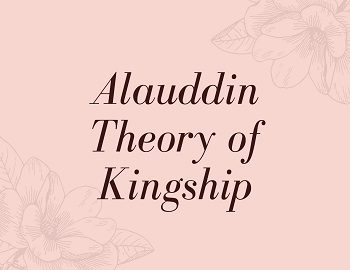Theory of Kingship under Alauddin Khalji:
Alauddin Khalji was shrewd enough to see the exigencies of the state more clearly than any of his predecessors. He held a very exalted conception of kingship, the absolute state was the ideal for which he worked- a state untrammelled by the authority of the Ulema, unhampered by the influence of a powerful nobility and unchallenged by the Hindu rais, ranas, rawats etc.
- He rejected the racial policy of Ilbari Turks and opened the gate of nobility class not simply to non-Turks but even to Indian Muslims. He declared that “Kingship knows no kinship”. In fact, he was having before him two different models of kingship- a model of Balban and that of Jalaluddin Khalji. The model of Balban was having two features. Firstly, the policy of terror and secondly the racial policy. Likewise, even the model of Jalaluddin Khalji was having two different features such as the rejection of the racial policy of Ilbari Turks and the liberal policy of the state. Alauddin khalji borrowed something from both these models but left something else. For example, he borrowed the policy of terror from Balban but left (rejected) the racial policy. Likewise, he borrowed anti-racial policy from Jalaluddin Khalji but rejected his liberal policy.
- The Secularization of state policy- Alauddin Khalji tried to separate politics from religion. In his talks to Qazi Mugusuddin, he made this point clear. Regarding the theory of kingship, we have to maintain that in the early stage of his rule Alauddin showed remarkable courage in setting aside the clerical authority. He made an attempt to graft a secular view to the Muslim state in India. Some content that he still called himself a lieutenant of the caliph; while others state that he refused to recognise any other legal power beyond his own kingdom and even styled himself as Caliph. Amir Khusrau, a shrewd observer considered him a good defender of Islam.
In spite of these facts, we have to admit that his attempt to secularize (in a way) the state was portentous. The Muslims always constituted a microscopic minority and that too a minority which was not interested in cultivation, administration and trade and commerce. So the Muslims state was compelled to rely more and more on the cooperation of the native population. It was these compelling forces that were behind the all-India policy of Akbar. In a way, the secularization of state was a sine qua non for the success of the Islamic State in India.
It was this new theory of kingship that was translated into ruthless autocracy in actual practice during Alauddin’s reign. As Alauddin was primarily guided by considerations of the security of the state, he spared none and did his best to maintain an efficient army. The severe restrictions that he imposed and the cruelties that he practised to achieve his purpose boomeranged.









Comments (No)